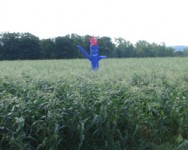Event Details
Date
February 29, 2016
Time
9:00 AM - 12:30 PM
Location
Roycroft Print Shop, Dard Hunter Hall (formerly CCE Erie's Aud)
21 South Grove Street
East Aurora, NY 14052
Cost
$25.00 for those enrolled in CCE Erie County or the CVP
$35.00 all others
Register online using the link provided to the left or contact Eva McKendry
Host
CCE Erie County and Cornell Vegetable Program
Eva McKendry
716-652-5400 x176
email Eva McKendry
Erie County Vegetable Growers Meeting
February 29, 2016
Cornell Cooperative Extension of Erie County is holding the 3nd annual Vegetable Growers Meeting. This year the meeting will take place on February 29, 2016 and will be held at the Roycroft Print Shop*, Dard Hunter Hall, formerly Cornell Cooperative Extension of Erie County's Auditorium, 21 South Grove Street, East Aurora, NY 14052.
The program will include presentations by the Cornell Vegetable Program (CVP) specialists Darcy Telenko, Robert Hadad and Judson Reid, and will include research updates on sweet corn bird and weed management; living mulch; and the final ruling of the Food Safety Modernization Act (FSMA) - what it means for your farm planning, training and timelines. In addition, Dr. Elizabeth Lamb, NYS Integrated Pest Management Program, will discuss IPM in greenhouse vegetable transplants; Allen Young, NRCS Erie County, will discuss cover crops; and Megan Burley, CCE Erie County, will lead a marketing roundtable session. The CVP team will also lead discussions during lunch about fresh market vegetable research priorities and needs, and the Western NY Food Hub.
The cost to attend is $25 for CCE Erie County enrollees and Cornell Vegetable Program enrollees; $35 for all others. CCA and 2.0 DEC credits will be available - but you must attend the entire meeting for credit (1A, 10, 21, 23, & 24). Register online or contact Eva McKendry via email or call 716-652-5400 x176.
* Location is subject to change, please check the website at erie.cce.cornell.edu or call 716-652-5400 x138 a day or two prior to attending the meeting to confirm the location.



































